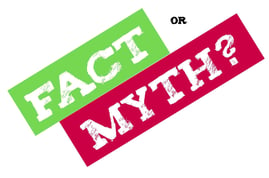 Concerning nutrition, there are hundreds of “dos and don’ts” out there. These often conflicting pieces of information can be misleading, contradictory, and sometimes, just plain wrong. To help you have a better, more accurate view on nutrition, we’ve compiled this list of common nutrition myths for you to read, and counter them with factual information.
Concerning nutrition, there are hundreds of “dos and don’ts” out there. These often conflicting pieces of information can be misleading, contradictory, and sometimes, just plain wrong. To help you have a better, more accurate view on nutrition, we’ve compiled this list of common nutrition myths for you to read, and counter them with factual information.
1. Nutritional Myth 1 - A higher protein intake is dangerous
Just to clarify, a high protein intake will not deplete your bone calcium content. In fact, we recommend taking in as many grams of protein a day as you would like to weigh in pounds (If you want to weigh 185 lbs., try to consume 185 grams of protein over the course of the day). It is best to spread this intake over several meals throughout the course of the day so that you are constantly running your metabolism. It’s important to remember that protein can dehydrate you, so make sure to increase the amount of water you take in as you increase the amount of protein you take in. When making the change of adding more protein to your diet, be sure to add more fiber to your diet as well.
2. Nutritional Myth 2 - You shouldn't combine carbohydrates with fats
When combining two nutrients, the most important thing to watch out for is an excessive caloric intake. If you can avoid eating too many calories, you probably won’t be putting yourself in risk of weight gain. Consuming a meal that contains a good balance of healthy fats, complex carbs, and lean protein will often result in a more nutritious meal that helps keep your energy level stable.
3. Nutritional Myth 3 - Gluten-free diets will lead to weight loss
A gluten-free diet does not mean a fat free diet, or even a low-calorie diet. Simply substituting foods that contain gluten for heavily processed “gluten-free” alternatives is not a viable means of weight loss; in fact, many people see their diet plateau or experience weight gain with this type of diet change. Remember, just because it is gluten-free does not make it the world’s next super-food -- there are several unhealthy, gluten-free options on the market.
4. Nutritional Myth 4 - Detoxing is great way to achieve weight loss
Partaking in detoxes can give you a healthy dose of antioxidants, however they are known for being too low in calories and protein. Even though you may be ridding your body of toxins, you are also likely encouraging your metabolism to crash and your body becomes deprived of many essential nutrients. After the detox, many people find that the pounds they lost are usually water weight, and they often end up gaining the weight back down the road. If you want to increase your antioxidant intake, try eating a serving of berries with every meal.
5. Nutritional Myth 5 - Eggs will put you at risk for heart problems
Though a rich source of cholesterol, eggs are actually very healthy. Despite containing high amounts of cholesterol (one egg yolk contains around 450 mg of cholesterol while the daily dose is around 300mg), egg yolks actually have significant health benefits. Eye health and function can be supported by the carotenoids in the yellow goo. In addition, it is also one of the richest sources of the B-vitamin complex choline, which is known to improve neurological function and reduce inflammation. Over-indulging on eggs may not be a very healthy way to improve your health, but an egg or two a day can be of benefit to your health. If your hunger is still being egged-on after that, try incorporating egg whites into your meal as a lower cholesterol alternative.
6. Nutritional Myth 6 - Honey is natural and therefore is good for you
Just because the label claims the product is “natural,” does NOT mean honey is a healthy alternative to artificial sweeteners or granulated sugar. Honey does, in fact, contain more nutrients than sugar (vitamin B6, thiamin, niacin, riboflavin, pantothenic acid, calcium, copper, iron, and magnesium), but the sugar in honey will always be just as unhealthy as any other sugar. Too much sugar can cause an increased risk of type 2 diabetes and weight gain.
7. Nutritional Myth 7 - Fat from beef should be avoided
A healthy heart does not require turning your back on red meat. Contrary to popular opinion, beef is actually not too high in saturated fats to be a part of a healthy diet. For the healthiest beef option, choose grass-fed meats, as they are typically rich in CLA fat, which is particularly good at helping the body burn fat. Not only does red meat provide with you a great source of protein, creatine, amino acids, and vitamins, it will help promote a lean body with full muscles.
Ultimately, there will always be plenty sources of information out there about nutrition that are not true. That is why it is important to be careful when conducting research, and when you have questions, contact an expert. At Jax Nutrition, we are more than happy to not only answer any questions you may have, but help you develop a plan to ensure that you eat in the healthiest way possible, no matter what lifestyle you embrace.


